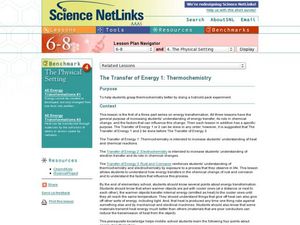Curated OER
Watershed Works: Unit 3
Geology whizzes observe the effects of change within a model of a watershed. They place replica waste dumps within the models and note the path that the waste takes as water passes through. This detailed lesson plan provides teacher...
Royal Society of Chemistry
Acids and Bases—Microscale Chemistry
Here's proof that small-scale labs lead to big-time learning. Introduce acid-base interactions to middle school scientists through a microscale chemistry lab. Pupils combine a variety of solutions and use indicators to obtain approximate...
University of Colorado
Strange New Planet
The first remote sensors were people in hot air balloons taking photographs of Earth to make maps. Expose middle school learners to space exploration with the use of remote sensing. Groups explore and make observations of a new planet by...
University of Colorado
Using Spectral Data to Explore Saturn and Titan
Saturn's rings are made of dust, ice, and solid chunks of material. Individuals use spectrographs in this final installment of 22 lessons to determine the atmospheric elements. They analyze spectrums from Titan's atmosphere and Saturn's...
Curated OER
How to Make a Wind Vane
Students measure the direction of the wind. For this Science lesson, students make their own wind vane. Students discuss the importance of wind direction and speed.
American Institute of Architects
Architecture: It's Elementary!—Fifth Grade
Young citizens construct an understanding of urban planning in this cross-curricular unit. Covering every aspect of city development from the political, economic, and social influences to sustainable building practices, this 10-lesson...
California Academy of Science
What Would Happen?
Nothing says classroom fun like an invertebrate and a magnifying glass! Snails, earthworms, and roly-poly bugs become the center of attention as pint-sized investigators hone their inquiry and observation skills. They are guided through...
Curated OER
The Environment
Students explore the issues that influence our environment and research ways to decrease the negative impact that humans have on the environment. Misconceptions about environmental issues are addressed in this lesson.
NOAA
Invertebrates
Crabs and lobsters ... yum! The 18th installment of a 23-part NOAA Enrichment in Marine sciences and Oceanography (NEMO) program focuses on invertebrate marine life. After the lecture slideshow, learners conduct an activity to sample...
Discovery Education
Make it all Better!
Discover how innovations can help your school and community. In the three-part STEM lesson, scholars learn the meaning of innovation and brainstorm innovations in their schools. They identify issues in their communities and think of...
Curated OER
Coloring the Life Cycle of Fruits and Vegetables
Students investigate how fruits and vegetables change and grow. In this life cycle of fruits and vegetables lesson, students observe the changes in fruits and vegetables as they grow and record the colors on a worksheet.
Curated OER
Solar Sweet Tea
Students study the sun. In this heat energy lesson, students use the sun's warmth to make tea. They place a few jars with tea bags and water in the sun and discuss what the sun is doing to the water while they wait for the tea to brew....
NOAA
Ocean Layers II
Now that you know the ocean has layers, let's name them. The seventh installment of a 23-part NOAA Enrichment in Marine sciences and Oceanography (NEMO) program covers terminology associated with ocean layers, such as thermocline and...
Teach Engineering
Incoming Asteroid! What's the Problem?
Oh, no! An asteroid is on a collision course with Earth!. Class members must rise to the challenge of designing a shelter that will protect people from the impact and permit them to live in this shelter for one year. In this first lesson...
Curated OER
Sort the Compost Bin
Students discover what compost is. In this composting instructional activity, students view a sample of a compost bin and define what the purpose of compost is. Students discuss what the compost bin consists of and sort the compost bin...
EduGAINs
Go H2O! Investigating Residential Water Systems
Before your learners excuse themselves to get a drink at the water fountain, prompt them to think about where that water comes from. A middle school science lesson encourages groups to research their community's source of drinking water,...
Curated OER
Recyclers to the Rescue
Producers, consumers, food chains, and plants are the stars of this science lesson. Learners take part in an inquiry which helps them to discover the most effective and efficient way to grow a producer. They have a variety of containers...
Polar Trec
Animal Monitoring Introduction
Not only do mealworms taste great, they are also great for classroom science lessons. In pairs, young scientists observe and record what they see as they check out what their mealworms are doing from minute to minute. Each minute...
Center for Learning in Action
Properties of Balls
Enhance your states of matter lessons with a hands-on science investigation that compares six different balls' color, texture, size, weight, ability to bounce, and buoyancy.
Curated OER
Exploring Magnets and Magnetism
Here is a very good lesson on magnets, magnetism, and magnitic fields that is chock full of great activities for you to implement with your young scientists. Learners discover the properties of magnets, look at the forces of attraction...
Curated OER
The Water Cycle
An inventive and interesting lesson on the water cycle (and other cycles associated with it), is here for you. After doing a well-designed hands-on inquiry in class, learners also identify organisms and processes that are involved in the...
Curated OER
Simple Machines IV - Levers
The lever is an everyday simple machine. Youngsters learn the principles of levers and explore their many uses. Groups of pupils perform a simple lab where they lift objects with a fulcrum while placing the load in a variety of...
Curated OER
Changes in Nature
The goal of this science lesson is to have youngsters be able to identify the physical and chemical changes in the carbon cycle, and water cycle due to weathering. The in-class inquiry/experiment is quite interesting and easy to...
Curated OER
The Transfer of Energy 1: Thermochemistry
Budding chemists achieve a basic understanding of the role of heat in chemical reactions. An online worksheet gives learners instructions and questions to answer as they investigate the Chem4Kids website and perform a hands-on lab...
Other popular searches
- Inquiry Based Science Lessons
- Life Science Inquiry Lessons
- Inquiry Science Lessons
- Inquiry Based Science Lessons

























